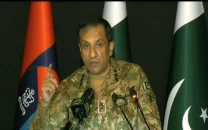Modi up Sir Creek!
Modi’s letter on Sir Creek is a political gimmick and spurred by his national ambitions.

Modi up Sir Creek!
“I would earnestly request you to stop this dialogue with Pakistan at once and [sic] Sir Creek should not be handed over to Pakistan. I am writing to you at this juncture as I was told that a decision is being taken on [the] Sir Creek issue on December 15.”
According to Mr Modi’s letter, “Even the tribunal verdict in 1968 headed by [the] British Prime Minister Harold Wilson shows [sic] Pakistan getting only 10 per cent of its claim of [the] 9,000 sq km of this border area.”
The report made me chuckle.
Earlier this month I was part of a delegation that went to New Delhi for a strategy dialogue, focusing on the two disputes of Siachen and Sir Creek, both generally described as ‘low hanging fruit’, presumably easy for the picking. The idea of the Delhi dialogue was to explore how these two disputes could be resolved in order to set the ground for the resolution of those disputes that, conversely, hang high and offer a greater degree of difficulty.
The expectations, on the Pakistani side, were pinned on the fact that the agreements on Siachen have been awaiting signatures since 1989 and subsequently 1992 and 1996. Similarly, on Sir Creek, the two navies have conducted surveys, including a joint survey and all that is needed is the political will to endorse the findings on the ground.
This was not to be and for good reason too. Ground lost is nary recovered at the table unless there is an exchange. Since the dialogue was conducted on Chatham House rules, I will only give a gist of my own thoughts on the subject, focusing primarily on Sir Creek.
But before I go any further, let me point to a factual error in Mr Modi’s letter which is more serious than the fact that he needs to get someone on the staff who knows the use of the definite article — the implied linking of the Indo-Pakistani Western Boundary Tribunal verdict on the Rann of Kutch dispute with the settlement of Sir Creek is incorrect because neither Pakistan nor India referred the matter of the Creek to that Tribunal.
In a brilliant paper for the Vermont Law Review, Assistant Professor, Department of Law and Policy at LUMS, Sikander Ahmed Shah, wrote: “Interestingly, while presenting their position to the tribunal, the two nations did not contest the westernmost part of the boundary of the Rann of Kutch, which commenced from a point called ‘Western Terminus’ to the head of Sir Creek further to the west. In addition, both states avoided tabling the issue of the demarcation of the boundary between the top of Sir Creek to its mouth at the Arabian Sea in the southwest before the tribunal. By avoiding addressing the Sir Creek boundary issue through arbitration, India and Pakistan actually ended up giving birth to the dispute.”
We do not know why India did not do so but Pakistan’s reason was simple: Sir Creek is not a disputed area. Much has recently been written on Pakistan’s refusal to accept the thalweg principle, which is a difficult way of referring to the deepest continuous line in a watercourse, generally the midcourse. Under International Law, the thalweg generally constitutes the boundary between two states.
This is a generally accepted principle. However, in the case of Sir Creek, when a dispute arose between Sindh and the Kutch Darbar (over collecting firewood, such being the irony), the settlement, in 1914, was made on the basis of a compromise. The Sindh government was to forgo its claim on Kori Creek, further east of Sir Creek “to acquire ownership over the entire Sir Creek”.
“The 1914 Resolution map shows a green line running along on the eastern bank of Sir Creek on the Kutch side of the river as the boundary between Sind and Kutch.... Therefore, Pakistan argues that the Sir Creek boundary delimitation was not only meant to be on the eastern bank of the river, but was also meant to be permanently fixed under the 1914 Resolution.” (Shah; VLR). In essence, Sir Creek is not disputed and belongs to Pakistan.
India argues that the B-44 map was nothing more than an annexure to the 1914 Resolution. It points to an “official note of May 19, 1958” in support of its claim. Further that “Letter Number 5543, the basis of Resolution 1192, contains a statement of the Commissioner in Sind[h], who is also ‘the predecessor in interest of Pakistan’, as supporting India’s position that the thalweg of Sir Creek is the actual boundary in the river. In the alternative, India also claims that the 1914 Resolution Map was fully implemented in 1924, when the region was demarcated by pillars”.
[NB: Shah in his VLR paper effectively demolishes the Indian case on several bases but essentially on the principle in International Law of uti possidetis juris that posits that decolonised sovereign states should have the same borders that their preceding dependent area had before independence. Here’s the link for interested readers.
The Creek in and of itself is not very important. What makes it so is that its delineation will “impact the determination of the Territorial Sea, the Exclusive Economic Zone (EEZ), and the Continental Shelf of both states”. In Pakistan’s case, it stands to “lose 2,246 square kilometres of EEZ if the thalweg of the Sir Creek is delimited as the boundary”.
The navies have come up with some innovative ideas like declaring the area a free zone or leaving the Creek aside and demarcating the sea boundary, etc but it is unlikely that the Government of India can exercise the will to implement any of those ideas, given that any dispute with Pakistan is more about divisive domestic politics than the benefits of a longer-term bilateral settlement.
Mr Modi’s letter is a political gimmick — just as Gujarat went into elections — and spurred by his national ambitions. It serves well to place the UPA government on notice.
Oh and I also chuckled reading the report because one participant in his/her enthusiasm thought it was a good idea to get the provincial government of Sindh and the Gujarat government to figure out a resolution!
Published in The Express Tribune, December 15th, 2012.



















COMMENTS
Comments are moderated and generally will be posted if they are on-topic and not abusive.
For more information, please see our Comments FAQ